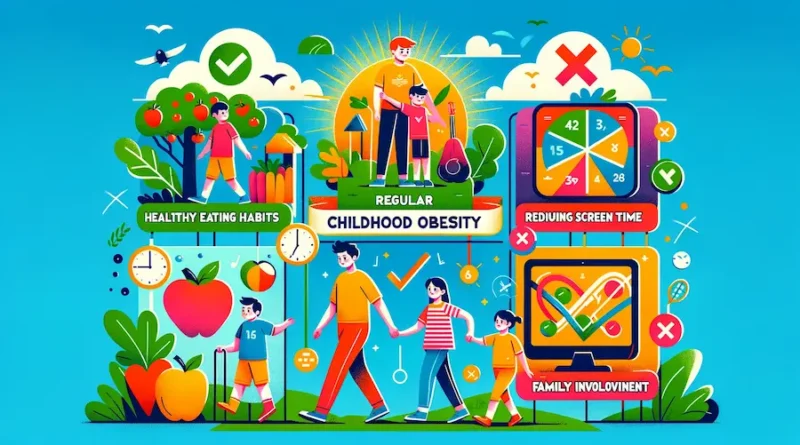How to Combat Childhood Obesity
Everyone loves cuddly babies. Their chubby cheeks are the cutest, but as they grow older, baby fat may become a problem if it persists. Overweight kids may be physically slower, which could propagate a vicious cycle of gaining weight. The excess weight can make it difficult to exercise. When they don’t work out, they gain more weight. Kids are often too young to know better, so parents and guardians must help them before their health deteriorates.
Childhood obesity can bring a myriad of physical, emotional, and social problems with it. These little ones are prone to having high cholesterol, insulin resistance, and even liver disease. Their mental health may also be at risk, as they’re often victims of bullying and poor self-image. Although genetics do play a role, bad habits are to blame as well. It’s often seen that bad habits originate in childhood such as when good behavior is always rewarded with cookies.
Children aren’t far-sighted enough to understand long-term health benefits. They just want to have fun. Parents need to help make the right choices more fun for them. Follow these tips to plant the seeds of healthy habits today so they bloom into a healthy lifestyle tomorrow.
1. Advocate Activity
Technology has done wonders to bring the world closer, but often at the cost of physical activity. Make outdoor activities a part of children’s lives from a young age. Spending time on playground equipment not only improves muscle strength but also enhances their social skills and critical thinking. Bad weather should not be an excuse. If it’s too cold outside, look for indoor playgrounds.
Remember you’re competing with video games, so you’ll have to be creative to get their attention. Instead of calling it a walk around the block, turn it into a quest for a lost treasure. Even when indoors, plan scavenger hunts and play hide-and-seek to keep them active. You can even take them grocery shopping with you, as long as they don’t fill the cart with junk food.
2. Diversify Diet
Involving children in meal planning and preparation is a great way to get them excited about healthy food. Pretend you are scientists working on a secret recipe to grow taller or wizards making a magic potion to run faster. Tell them that sugary drinks and snacks attack their teeth, so they should avoid having them. Use similar stories and role play to make healthy eating fun for kids.
Kids love colors, so add fruits and vegetables to their meals and snacks. Mix and match different tastes to see what suits their taste buds and encourage them to try new food. When time is short, blend fruits and vegetables into a smoothie so they slurp up all the vitamins in one go. Such drinks are great for snacks or when you need something nutritious on the go.
3. Eliminate Emotional Eating
Binge eating is an established mechanism for stress-relief. While kids don’t worry about rent or bills, an upcoming math test may be just as stressful for them. Many kids turn to television as an escape and munch on chips and cookies while watching their favorite shows. Identify signs of emotional eating and help them find healthier ways to cope before stress-eating becomes a habit for life.
Adults should reconsider the role they play in developing eating habits in children. Kids who get candy for being good, treat themselves to desserts when they do well as adults. You need to remove the association between fun and food. Instead link outdoor activities with celebrations so their emotional wellbeing is strengthened along with their physical wellbeing.
4. Focus on Fitness
Mental health is just as important as physical health. So don’t forget about the kids’ mental health in the pursuit of physical health. Your goal shouldn’t be a number on the scale but their overall health. Every child has a different build and bone structure, so don’t compare children to each other. Children should be reminded they are loved and valued and you’re simply helping them be stronger.
Apart from food, teach them healthy habits related to hydration and sleep as well. Their bedtime routine could include dimmed lights, warm milk, or a bedtime story to help them unwind. This isn’t a one-time thing. You’ll have to establish a consistent routine for it to become a life-long habit. It won’t be easy if they know you’re eating ice cream and binging shows after putting them to bed. So, you might have to work on yourself too.
5. Lead by Example
Children don’t want to be left out of the fun. If you’re enjoying a bike ride, they’ll do the same. If you’re enjoying supersized fries, they’ll follow suit. Adults play a vital role in shaping the health and wellbeing of the kids around them. No matter how busy you are, be sure to have at least one meal each day with your kids. Having a meal together is the best time for family bonding — as long as no screens are involved.
Along with your bad eating habits, also control what you say about your own or other people’s body. If your child hears you talk about diets all the time, they might go to extreme measures to lose weight. Blame or guilt associated with eating can be more harmful than being overweight. Appreciate active people of all sizes so your child knows the goal is to be healthy not thin.
As sedentary lifestyles and processed food are becoming more common, the threat of obesity is constantly lurking. Don’t let your children succumb to peer pressure. Rather, help them make healthy choices related to food and activities. It may be a long journey so be patient, yet persistent, and be optimistic about their progress. Remember, small changes can make a big difference in the long run. So, start nurturing healthy habits today for a healthy future tomorrow.

